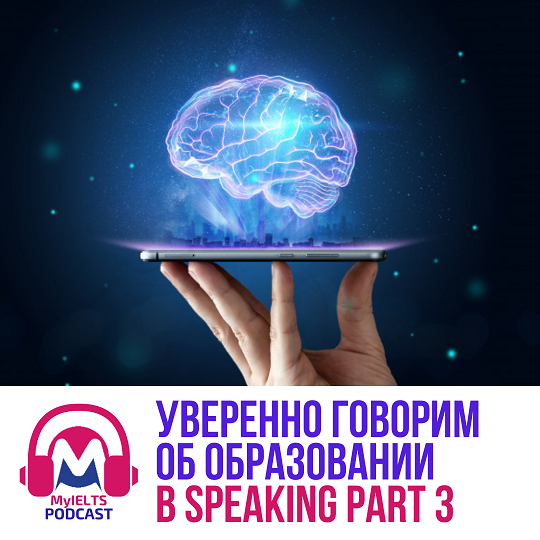Разбираем сложные вопросы Speaking Part 3, которые требуют развернутых ответов и рассуждений.
подписаться на подкаст на Apple Podcasts | Google Podcasts, чтобы получать новые выпуски автоматически
Тема образования особенно любима в IELTS, потому что встретиться она может буквально в любой секции экзамена — от Listening до Speaking.
Сегодня в нашем фокусе — Speaking Part 3, особенность которой в том, что от вас ждут рассуждений на вопросы глобального характера. Они не будут о вас конкретно, а подталкивают вас говорить в общем, на уровне общества, страны или мира.
Тут как раз включаются ваши ресурсы, которые вы почерпнули из чтения, аудирования, просмотра интервью, текстов из IELTS (которые кстати информативны!), статей и т.п.
Длительность ответов в Part 3 не привязана ко времени, т.е. от вас не ждут безостановочной речи в течение 2 минут, как, например, в Part 2.
Но ваши ответы желательно делать развернутыми, в 4-5 предложениях.
Вот несколько вопросов, которые задавали кандидатам на реальных экзаменах IELTS в некоторых странах мира во втором полугодии 2019 года.
Обратите внимание на то, насколько ответы подробны и какие детали в них используются.
Совет: дайте ответ на заданный вопрос сразу в своей первой фразе, а затем рассуждайте, почему вы дали именно этот ответ. Предоставляя детали, вы показываете свой вокабуляр, грамматику, расстановку интонаций, и все это, как вы понимаете, работает на вас и наш балл.
– How can teachers motivate children to study?
Well, teachers need to speak the same language with their young learners. As we all know, children love playing. So teachers should use strategies that somehow have to do with games. Gamification is a new chapter in people’s lives these days. And Education is not an exception, so teachers can use these gamification techniques to encourage children to play and have this healthy competition. And when a kid wants to win, they would be more motivated to study than when they just have to sit and listen to an adult.
– Is the way children learn different from that of adults?
That’s funny! Yes and no. Yes, because numerous times I have seen how adults turn into children when they start learning something new. They don’t talk much, they just listen and try to figure out what’s going on. They make mistakes that may seem silly sometimes. That’s what makes then look like children sometimes. On the other hand, children are usually more focused on their studies, they don’t have their jobs or families to take care of, so they can be fully immersed in an educational process.
– How has teaching changed in your country in the last 20 years?
Well, like everywhere else, my country has gone through tremendous reforms in education, and teachers now are pushed to use technology and keep up with the speed of learning that their students have. Teaching in my country still builds on Soviet style sometimes, especially among the older generation of teachers, but those who are younger do adapt western teaching approaches. They develop critical thinking, they focus on the visual part of delivering their material since images had become so vital for the culture the planet lives in. And they encourage students to self-study — and nowadays is the time when it costs almost nothing for students to study on their own because of the Internet.
– What changes do you think will happen in teaching in the future?
I see it as a sunset of traditional classroom-based education the way know it today. I mean student will be spending less and less time in classroom. Distance learning will take its place and it will be about learning something that is applicable to practice, and there will be more freedom for students to choose what they’re willing to study. That will definitely increase their motivation and will encourage them to learn more.

